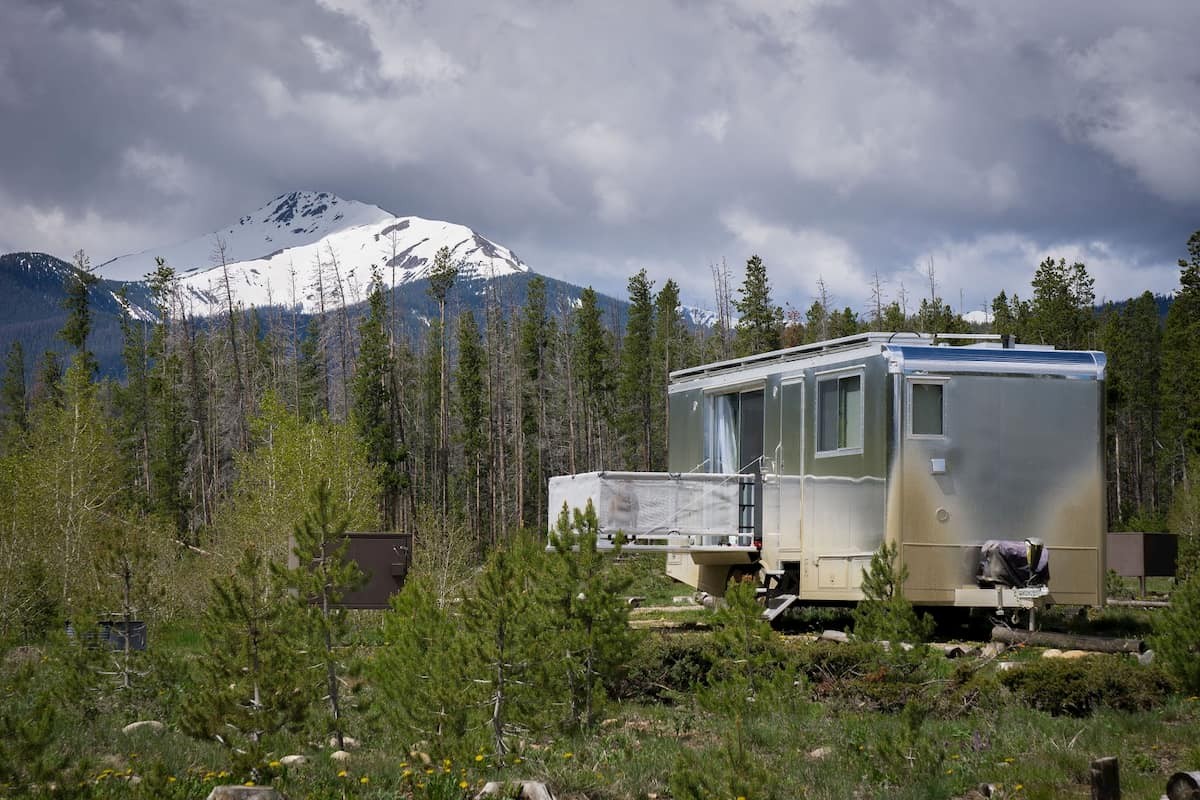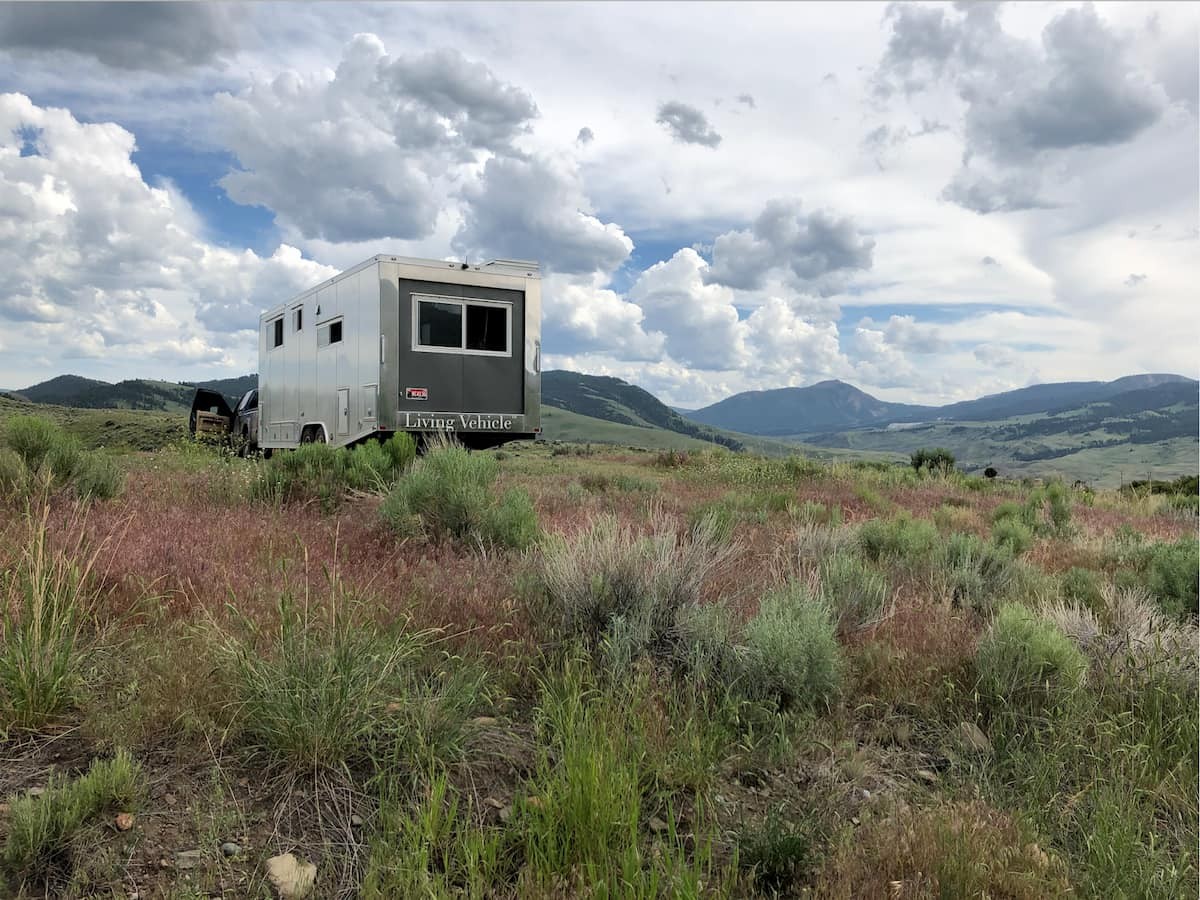Are Travel Trailers Self Contained? Absolutely, and TRAVELS.EDU.VN is here to guide you through everything you need to know about these versatile homes on wheels. From understanding the basics of self-containment to exploring the benefits of luxury off-grid living, we’ll help you discover how travel trailers can offer freedom, flexibility, and unforgettable experiences. These RVs provide convenience, independence, and the ability to explore stunning destinations.
1. Understanding Self-Contained Travel Trailers
A self-contained travel trailer is designed to operate independently of external utilities and services. This means it has onboard systems for water storage, waste management, power generation, and often, cooking and sanitation.
1.1. What Does “Self-Contained” Really Mean?
Being self-contained means your travel trailer can function without hookups to city water, electricity, or sewer systems. This opens up a world of possibilities, allowing you to camp in remote locations, boondock in national forests, or simply enjoy the freedom of not being tied to traditional campgrounds.
1.2. Key Components of a Self-Contained Travel Trailer
- Fresh Water Tank: Stores potable water for drinking, cooking, and showering.
- Gray Water Tank: Collects wastewater from sinks and showers.
- Black Water Tank: Holds sewage from the toilet.
- Power System: Includes batteries, generators, and often solar panels to provide electricity.
- Toilet and Shower: Provides sanitation and hygiene facilities.
- Kitchen: Equipped with a stove, sink, and refrigerator for meal preparation.
1.3. Differences Between Self-Contained and Non-Self-Contained Trailers
| Feature | Self-Contained Trailer | Non-Self-Contained Trailer |
|---|---|---|
| Water Storage | Includes fresh, gray, and black water tanks | May only have a fresh water tank |
| Waste Management | Onboard toilet and holding tanks | Requires external toilet facilities |
| Power | Battery, generator, and often solar panels | Primarily relies on campground hookups |
| Kitchen | Fully equipped with stove, sink, and refrigerator | May have limited or no kitchen facilities |
| Independence | Can operate independently of external utilities | Requires access to campground amenities |
1.4. Benefits of Choosing a Self-Contained Model
- Freedom and Flexibility: Camp in remote locations without needing hookups.
- Convenience: Enjoy the comforts of home wherever you go.
- Cost Savings: Reduce reliance on expensive campground fees.
- Environmental Friendliness: Conserve water and energy by managing your own resources.
- Privacy: Avoid crowded campgrounds and enjoy a more secluded experience.
2. Essential Systems for Self-Sufficiency
To maximize the benefits of a self-contained travel trailer, it’s important to understand the essential systems that keep it running smoothly.
2.1. Water Management: Fresh, Gray, and Black Water
Proper water management is crucial for extending your off-grid capabilities.
- Fresh Water: Choose a trailer with a large fresh water tank (75-100 gallons is ideal for extended trips). Conserve water by using low-flow showerheads and faucets, and consider installing a water filtration system for drinking water.
- Gray Water: Be mindful of gray water usage by taking shorter showers and minimizing water waste while washing dishes. Some trailers offer gray water recycling systems for flushing toilets or irrigating plants.
- Black Water: Use a composting or incinerating toilet to eliminate the need for a black water tank. If you have a traditional toilet, use toilet paper sparingly and consider adding enzymatic tank treatments to reduce odors and break down waste.
2.2. Power Generation and Storage: Batteries, Generators, and Solar Panels
Reliable power is essential for running appliances, lights, and electronic devices.
- Batteries: Invest in high-capacity batteries (lithium-ion batteries are a great option) to store power generated by solar panels or a generator.
- Generators: A generator can provide backup power when solar energy is limited. Choose a quiet, fuel-efficient model with remote start capabilities.
- Solar Panels: Install solar panels on the roof of your trailer to harness the sun’s energy. Solar panels are a sustainable and cost-effective way to keep your batteries charged.
According to a report by the Solar Energy Industries Association (SEIA), solar energy is the fastest-growing source of electricity in the United States.
2.3. Waste Disposal Options: Traditional vs. Composting Toilets
Choosing the right toilet system can significantly impact your self-sufficiency.
- Traditional Toilets: Require a black water tank and regular dumping at designated stations.
- Composting Toilets: Use natural decomposition processes to break down waste, eliminating the need for a black water tank.
- Incinerating Toilets: Burn waste to ash, reducing it to a fraction of its original volume.
2.4. Kitchen Facilities: Cooking and Refrigeration
A well-equipped kitchen allows you to prepare meals and store food, reducing the need to eat out.
- Stove: Choose a propane-powered stove with multiple burners for versatile cooking options.
- Sink: Install a deep sink with a faucet that conserves water.
- Refrigerator: Opt for a residential-style refrigerator that runs on both electricity and propane for efficient cooling.
3. Maximizing Off-Grid Capabilities
Going off-grid requires careful planning and preparation.
3.1. Water Conservation Tips
- Take shorter showers.
- Use low-flow showerheads and faucets.
- Wash dishes efficiently.
- Collect rainwater for non-potable uses.
- Install a gray water recycling system.
3.2. Energy Efficiency Strategies
- Use LED lighting.
- Insulate your trailer to reduce heating and cooling needs.
- Use energy-efficient appliances.
- Turn off lights and appliances when not in use.
- Park in the shade to reduce cooling costs.
3.3. Choosing the Right Equipment and Appliances
- Solar Panels: Opt for high-efficiency solar panels that maximize power generation.
- Batteries: Invest in lithium-ion batteries for their long lifespan and high energy density.
- Generators: Choose a quiet, fuel-efficient generator with remote start capabilities.
- Appliances: Select appliances with the Energy Star label for maximum energy efficiency.
3.4. Understanding Your Energy Needs
Calculate your daily energy consumption to determine the right size solar panel and battery system. Consider factors such as:
- Lighting
- Appliance usage
- Electronics charging
- Heating and cooling
4. Luxury Off-Grid Living: The Ultimate Freedom
Luxury off-grid living combines self-sufficiency with comfort and style.
4.1. Defining Luxury in Off-Grid Travel Trailers
Luxury is about having the best choices and the freedom to make decisions that are best for you.
4.2. High-End Features and Amenities
- Spacious living areas
- Gourmet kitchens
- Spa-like bathrooms
- High-tech entertainment systems
- Climate control
- Advanced power management systems
4.3. The Importance of Adequate Power and Redundancy
A luxury travel trailer should supply you with adequate power, both in stored battery power and continuous resupply through generous high-efficiency roof-mounted solar panels along with redundant backup power supplies.
4.4. Case Studies of Luxury Off-Grid Travel Trailers
Consider manufacturers like Living Vehicle, known for their high-end travel trailers designed for extended off-grid living.
5. Off-Road vs. Off-Grid: What’s the Difference?
Understanding the distinction between off-road and off-grid capabilities is crucial.
5.1. Off-Road Trailers: Designed for Rugged Terrain
Off-road trailers are built with enhanced suspension, tires, and ground clearance to handle rough terrain.
5.2. Off-Grid Trailers: Focused on Utility Independence
Off-grid trailers prioritize self-sufficiency with onboard water, power, and waste management systems.
5.3. Combining Off-Road and Off-Grid Capabilities
The ideal travel trailer combines both off-road and off-grid features, allowing you to explore remote locations while enjoying the comforts of home.
6. Practical Considerations for Off-Grid Travel
6.1. Choosing the Right Location
Research your destination to ensure it’s suitable for off-grid camping.
6.2. Planning Your Route and Resources
Plan your route carefully, taking into account water sources, fuel supplies, and dumping stations.
6.3. Staying Safe and Connected
Invest in a satellite communication device for emergencies.
6.4. Respecting the Environment
Practice Leave No Trace principles to minimize your impact on the environment.
- Pack out everything you pack in.
- Dispose of waste properly.
- Minimize campfire impacts.
- Respect wildlife.
- Leave what you find.
7. Travel Trailer Maintenance for Self-Sufficiency
7.1. Regular Inspections
Inspect your trailer regularly for leaks, damage, and wear.
7.2. System Maintenance
- Clean your water tanks regularly.
- Maintain your power system.
- Empty and clean your waste tanks.
- Check your tires and brakes.
7.3. Troubleshooting Common Issues
Learn how to troubleshoot common issues such as:
- Low battery power
- Water leaks
- Toilet clogs
- Appliance malfunctions
7.4. Staying Informed
Stay up-to-date on the latest travel trailer technology and maintenance tips.
8. The Future of Self-Contained Travel Trailers
8.1. Emerging Technologies
- Advanced solar panels
- High-capacity batteries
- Smart home integration
- Water recycling systems
8.2. Sustainable Travel Practices
- Reducing your carbon footprint
- Conserving water and energy
- Supporting local communities
8.3. The Growing Popularity of Off-Grid Living
More and more people are embracing off-grid living for its freedom, flexibility, and environmental benefits.
9. Why Choose TRAVELS.EDU.VN for Your Travel Trailer Needs?
TRAVELS.EDU.VN is your trusted source for all things travel trailer related.
9.1. Expert Advice and Guidance
Our team of experts can help you choose the right travel trailer for your needs and budget.
9.2. Customized Travel Packages
We offer customized travel packages that include everything you need for a memorable off-grid adventure.
9.3. Unparalleled Customer Service
We provide unparalleled customer service from the moment you contact us until the end of your trip.
9.4. Creating Unforgettable Experiences
We are committed to creating unforgettable experiences that exceed your expectations.
10. Planning Your Napa Valley Getaway with a Self-Contained Trailer
Napa Valley offers a unique blend of natural beauty and luxury, making it an ideal destination for self-contained travel trailers.
10.1. Exploring Napa Valley in a Travel Trailer
Discover the rolling vineyards, picturesque towns, and world-class wineries of Napa Valley.
10.2. Finding Suitable Camping Locations
Look for campgrounds and RV parks that offer hookups or allow boondocking.
10.3. Must-See Attractions and Activities
- Wine tasting at renowned vineyards
- Hot air balloon rides over the valley
- Gourmet dining experiences
- Hiking and biking trails
10.4. How TRAVELS.EDU.VN Can Enhance Your Trip
TRAVELS.EDU.VN can help you plan your Napa Valley getaway, providing expert advice, customized travel packages, and unparalleled customer service.
11. Napa Valley Travel Tips
11.1. Best Time to Visit
The best time to visit Napa Valley is during the spring or fall when the weather is mild and the crowds are smaller.
11.2. What to Pack
Pack comfortable clothing, hiking shoes, sunscreen, and a hat.
11.3. Transportation Options
Consider renting a car or using ride-sharing services to explore the valley.
11.4. Local Customs and Etiquette
Be respectful of local customs and etiquette, especially when visiting wineries.
12. Emergency Preparedness for Off-Grid Travel
12.1. Essential Supplies
- First-aid kit
- Emergency food and water
- Navigation tools
- Communication devices
- Tools and repair kit
12.2. Communication Strategies
- Satellite phone
- Two-way radio
- Personal locator beacon
12.3. Dealing with Unexpected Weather Conditions
- Monitor weather forecasts
- Be prepared for sudden changes in weather
- Have a plan for evacuating if necessary
12.4. Securing Your Travel Trailer
- Park in a safe location
- Use wheel chocks and leveling blocks
- Lock your doors and windows
- Consider installing a security system
13. Environmental Impact of Off-Grid Travel
13.1. Reducing Your Carbon Footprint
- Use renewable energy sources
- Conserve water and energy
- Reduce waste
13.2. Conserving Water Resources
- Use low-flow fixtures
- Collect rainwater
- Recycle gray water
13.3. Waste Management Strategies
- Pack out everything you pack in
- Use composting toilets
- Minimize the use of disposable products
13.4. Supporting Local Economies
- Buy local products
- Eat at local restaurants
- Support local businesses
14. Community and Social Aspects of Travel Trailer Living
14.1. Joining RV Clubs and Groups
- Meet fellow travelers
- Share tips and advice
- Participate in group events
14.2. Online Forums and Communities
- Connect with other travel trailer enthusiasts
- Ask questions and get answers
- Share your experiences
14.3. Socializing on the Road
- Attend campground social events
- Visit local attractions
- Engage with local communities
14.4. Building a Sense of Community
- Be respectful of others
- Offer help when needed
- Share your knowledge and experiences
- Participate in community activities
15. The Legal Aspects of Self-Contained Travel Trailers
15.1. Regulations and Restrictions
- Research local regulations and restrictions
- Obtain necessary permits and licenses
- Comply with campground rules and regulations
15.2. Insurance Requirements
- Obtain adequate insurance coverage
- Understand your policy’s terms and conditions
- Keep your insurance documents up-to-date
15.3. Safety Standards
- Comply with safety standards
- Ensure your travel trailer is properly maintained
- Use safety equipment
15.4. Liability Considerations
- Understand your liability
- Take precautions to prevent accidents
- Be prepared to respond to emergencies
16. The Psychological Benefits of Off-Grid Travel
16.1. Stress Reduction
- Escape the stresses of modern life
- Connect with nature
- Enjoy peace and quiet
16.2. Enhanced Creativity
- Experience new environments
- Stimulate your imagination
- Discover new perspectives
16.3. Improved Mental Health
- Reduce anxiety and depression
- Boost your mood
- Increase self-esteem
16.4. Personal Growth
- Challenge yourself
- Learn new skills
- Expand your horizons
- Gain confidence
17. Frequently Asked Questions (FAQs) About Self-Contained Travel Trailers
1. What exactly does “self-contained” mean for a travel trailer?
It means the trailer can operate independently of external utilities like water, electricity, and sewer.
2. How long can a self-contained travel trailer stay off-grid?
It depends on water and power capacity, but with conservation, it can be extended indefinitely.
3. What are the key features of a self-contained travel trailer?
Fresh, gray, and black water tanks, a power system (batteries, generator, solar), toilet, shower, and kitchen.
4. Are composting toilets better for off-grid travel?
Yes, they eliminate the need for a black water tank, extending your off-grid capacity.
5. What size water tanks should I look for in a self-contained trailer?
Ideally, 75-100 gallons of fresh water for extended trips.
6. How can I conserve water while camping off-grid?
Use low-flow fixtures, take shorter showers, and recycle gray water.
7. What type of batteries are best for self-contained trailers?
Lithium-ion batteries are a great option due to their long lifespan and high energy density.
8. Should I invest in solar panels for my travel trailer?
Yes, solar panels are a sustainable and cost-effective way to keep your batteries charged.
9. What’s the difference between off-road and off-grid trailers?
Off-road trailers are designed for rugged terrain, while off-grid trailers focus on utility independence.
10. How can TRAVELS.EDU.VN help me plan my off-grid adventure?
We provide expert advice, customized travel packages, and unparalleled customer service.
18. Conclusion: Embrace the Freedom of Self-Contained Travel
Self-contained travel trailers offer unparalleled freedom, flexibility, and the ability to explore the world on your own terms. Whether you’re seeking a luxurious off-grid experience or simply want to enjoy the convenience of having all the comforts of home with you on the road, a self-contained travel trailer is an excellent choice.
Ready to start your adventure? Contact TRAVELS.EDU.VN today for expert advice and personalized travel planning. Our team is here to help you find the perfect travel trailer and create an unforgettable off-grid experience in Napa Valley or beyond.
Don’t wait—discover the freedom of self-contained travel with TRAVELS.EDU.VN! Contact us today at 123 Main St, Napa, CA 94559, United States, call us on Whatsapp at +1 (707) 257-5400, or visit our website at travels.edu.vn to start planning your dream getaway.
 travel trailer camping
travel trailer camping
Alt text: A scenic view of a self-contained travel trailer parked amidst rolling hills during a sunny day, perfect for off-grid adventure and freedom.
 off grid trailer
off grid trailer
Alt text: An off-grid travel trailer showcasing solar panels, emphasizing energy independence and mobile living convenience.
 rv trailer
rv trailer
Alt text: Exterior view of a luxury RV travel trailer highlighting its premium features, perfect for ultimate freedom and comfort on the road.